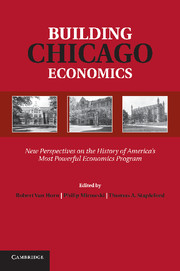 Building Chicago Economics
Building Chicago Economics Book contents
- Frontmatter
- Contents
- Figures and Tables
- Contributors
- Blueprints
- Orientation: In Search of the Chicago School
- Part One Economics Built for Policy: the Legacy of Milton Friedman
- Part Two Constructing the Institutional Foundations of the Chicago School
- Part Three Imperial Chicago
- Six Chicago Price Theory and Chicago Law and Economics
- Seven Intervening in Laissez-Faire Liberalism
- Eight Allusions to Evolution
- Nine On the Origins (at Chicago) of Some Species of Neoliberal Evolutionary Economics
- Part Four Debating “Chicago Neoliberalism”
- Index
- References
Six - Chicago Price Theory and Chicago Law and Economics
A Tale of Two Transitions
from Part Three - Imperial Chicago
Published online by Cambridge University Press: 05 November 2011
- Frontmatter
- Contents
- Figures and Tables
- Contributors
- Blueprints
- Orientation: In Search of the Chicago School
- Part One Economics Built for Policy: the Legacy of Milton Friedman
- Part Two Constructing the Institutional Foundations of the Chicago School
- Part Three Imperial Chicago
- Six Chicago Price Theory and Chicago Law and Economics
- Seven Intervening in Laissez-Faire Liberalism
- Eight Allusions to Evolution
- Nine On the Origins (at Chicago) of Some Species of Neoliberal Evolutionary Economics
- Part Four Debating “Chicago Neoliberalism”
- Index
- References
Summary
It is common practice to equate “law and economics” with the Chicago School and Chicago law and economics with Richard Posner and the economic analysis of law. Just as common is the tendency to equate Chicago microeconomics, or price theory, with Gary Becker, George Stigler, and the hard-nosed rational choice approach that has extended the economic paradigm across the social spectrum. In fact, however, these are distinctly modern variants of what are lengthy Chicago traditions in law and economics and price theory. The Chicago price theory tradition is now more than three quarters of a century old, and the law and economics tradition is only a couple of decades younger than that. However, Chicago price theory prior to, say, the 1960s was a rather different enterprise than that of the subsequent period. Likewise, law and economics at Chicago has undergone a major transformation during the same period, as pointed out by, for example, Alain Marciano (2008) and Steven Medema (, ). To date, however, there has not been a historical explanation given for this transformation in law and economics. The position taken here is that the transformations of price theory and law and economics are linked – specifically, that the transformation of Chicago law and economics evolved out of the transformation in price theory.
The first generation of Chicago law and economics – as reflected in the teaching and scholarship of Aaron Director, Director’s students, and Ronald Coase – has its foundations in the first generation of the Chicago price theory tradition, that is, in the approach to the subject found in the price theory courses and scholarship of Frank Knight, Jacob Viner, and, later, Milton Friedman. The second generation of Chicago law and economics – the economic analysis of law – is grounded in the rational choice theory, a form of price theory quite different from the “old” Chicago version, in spite of elements of common lineage, as well as a very different conception of “economics,” one that involved a (then) distinctive take on Lionel Robbins’s definition of the subject as “the science which studies human behaviour as a relationship between ends and scarce means which have alternative uses” (1932, 15).
- Type
- Chapter
- Information
- Building Chicago EconomicsNew Perspectives on the History of America's Most Powerful Economics Program, pp. 151 - 179Publisher: Cambridge University PressPrint publication year: 2011
References
- 23
- Cited by


